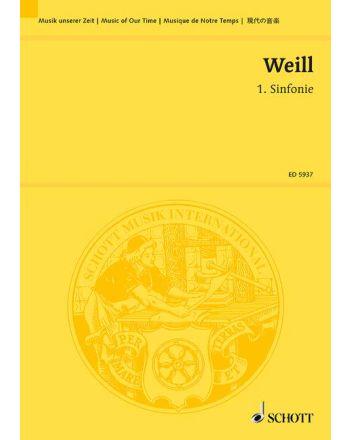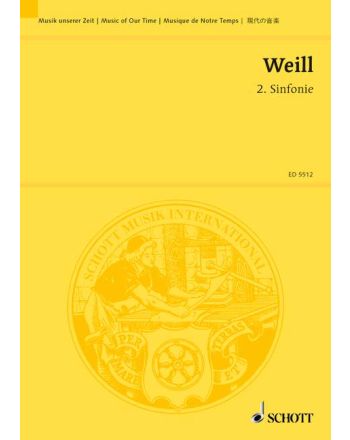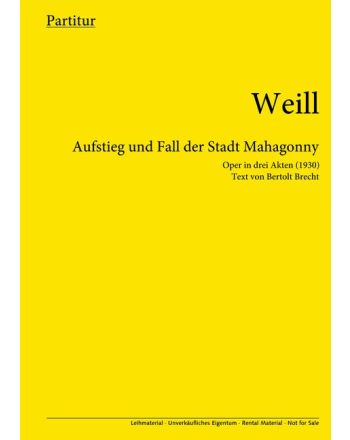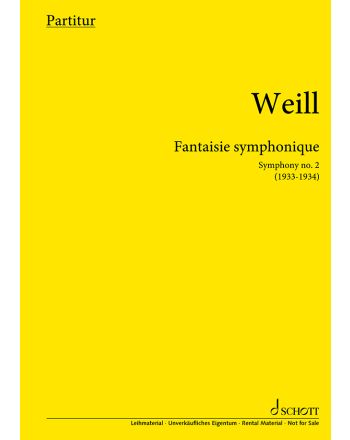
Kurt Weill
Upcoming Performances
About Kurt Weill
Kurt Weill was born in Dessau on 2 March 1900. Having displayed musical talent early on, he became a substitute accompanist at the Dessau Court Theater during the First World War, and - after studying theory and composition with Albert Bing - enrolled at the Berlin Hochschule für Musik. Not liking the training with Engelbert Humperdinck, though, he was accepted finally into Ferruccio Busoni’s master class in composition. In order to support himself, he conducted synagogue choirs, tutored students (e.g. Claudio Arrau, Maurice Abravanel) in music theory and contributed articles and reviews to "Der deutsche Rundfunk“.
By 1925, Weill had been established as one of the leading composers of his generation, along with Paul Hindemith and Ernst Krenek. In the same time, he turned to writing operas, collaborating a.o. with Georg Kaiser (e.g. Der Protagonist, Weill’s sensational theatrical debut in 1926, or Der Silbersee, 1933) and with Bertolt Brecht (e.g. Aufstieg und Fall der Stadt Mahagonny or the ballet The Seven Deadly Sins for Balanchine’s troupe). The Brecht-Weill piece Die Dreigroschenoper with its sometimes aggressive, sometimes sentimental popular song-style with elements of jazz, moritat and carabet songs remains one of his most famous works.
Weill’s compositions of the early thirties outraging the Nazis and campaigns discouraging productions of his work, Weill fled Germany in 1933 via Paris and London to America (in 1935) to oversee Max Reinhardt’s production of his opera Der Weg der Verheißung after Franz Werfel’s biblical spectacle. Weill and his wife Lotte Lenya stayed in the USA and applied for American citizenship.
Working mainly for Broadway, Weill established himself soon as a new and original voice in the American musical theater, often chosing unusual collaborators such as Paul Green, Maxwell Anderson, Ogden Nash, and Langston Hughes. He also completed two film scores, including Fritz Lang’s You and Me.
In 1946 Weill was elected as the only composer-member of the distinguished Playwrights Producing Company (founded in 1938) which brought his musical version of Elmer Rice’s Pulitzer-Prize winning drama Street Scene to Broadway as an American opera, the first real successor to "Porgy and Bess“. Weill’s experiment Lady in the Dark was a big success and his daring last two works for Broadway, the concept musical Love Life and the musical tragedy Lost in the Stars, challenged the Broadway institution and audience to a degree that would not be met until the 1970s in the Sondheim-Prince collaborations.
Apart from his numerous stage works (including pantomime, ballet, student opera and operetta), Weill wrote two symphonies and other orchestral works, two string quartets and different kinds of vocal works.
He died on 3 April 1950 in New York City.
- Kurt Weill Foundation for Music www.kwf.org
Worklist
Chronology
Products
-
in einem SatzProduct TypeIn stockAs low as €24.99Incl. Tax
-
for String QuartetPrint editionPrint editionOut of stock€41.00Incl. Tax, Excl. Shipping
-
for String QuartetPrint editionPrint editionOut of stock€90.00Incl. Tax, Excl. Shipping
-
Composer: Kurt WeillEditor: David DrewEdition: Study scoreSeries: Music Of Our Time
2. Sinfonie
Instrumentation: orchestraProduct number: ED 5512Product TypeIn stockAs low as €28.99Incl. Tax -
from the film "Where do We Go From Here?"Composer: Kurt WeillArranger: Jack MasonMedia Type: Hire/performance materialEdition: Performance materialLanguage: EnglishHire/performance materialHire/performance material
-
Opera in three actsComposer: Kurt WeillAuthor: Bertolt BrechtMedia Type: Hire/performance materialEdition: Performance materialLanguage: German, EnglishHire/performance materialHire/performance material
-
Alabama-Song (R. Ettlinger)Composer: Kurt WeillArranger: Richard EtlingerMedia Type: Hire/performance materialEdition: Performance materialLanguage: EnglishHire/performance materialHire/performance material
-
Suite of music for violin and wind ensembleComposer: Kurt WeillArranger: David DrewMedia Type: Hire/performance materialEdition: Performance materialHire/performance materialHire/performance material
-
(Berlin Lit Up)Composer: Kurt WeillArranger: Otto LindemannMedia Type: Hire/performance materialEdition: Performance materialHire/performance materialHire/performance material
-
(Berlin Lit Up)Hire/performance materialHire/performance material
-
for voice and jazz bandComposer: Kurt WeillArranger: Otto LindemannMedia Type: Hire/performance materialEdition: Performance materialLanguage: GermanHire/performance materialHire/performance material
-
(Songs of the Waterfront)Composer: Kurt WeillMedia Type: Hire/performance materialEdition: Performance materialLanguage: FrenchHire/performance materialHire/performance material
-
Kleine Kantate für Tenor, Bariton, MännerchorComposer: Kurt WeillMedia Type: Hire/performance materialEdition: Performance materialLanguage: GermanHire/performance materialHire/performance material
-
Schuloper in zwei AktenComposer: Kurt WeillMedia Type: Hire/performance materialEdition: Performance materialLanguage: German, EnglishHire/performance materialHire/performance material
-
(A Kingdom for a Cow)Composer: Kurt WeillEditor: Lys SymonetteMedia Type: Hire/performance materialEdition: Performance materialLanguage: German, EnglishHire/performance materialHire/performance material
-
Radiolehrstück für Tenor, Bariton, Bass,Composer: Kurt WeillMedia Type: Hire/performance materialEdition: Performance materialLanguage: GermanHire/performance materialHire/performance material
-
Cantata for soprano, solo violin and orchestraComposer: Kurt WeillAuthor: Yvan GollMedia Type: Hire/performance materialEdition: Performance materialLanguage: GermanHire/performance materialHire/performance material
-
PantomimeComposer: Kurt WeillMedia Type: Hire/performance materialEdition: Performance materialLanguage: GermanHire/performance materialHire/performance material
-
Ein Wintermärchen in drei AktenComposer: Kurt WeillMedia Type: Hire/performance materialEdition: Performance materialLanguage: German, EnglishHire/performance materialHire/performance material
-
Konzertfassung von David DrewComposer: Kurt WeillArranger: David DrewMedia Type: Hire/performance materialEdition: Performance materialLanguage: GermanHire/performance materialHire/performance material
-
Suite aus dem Wintermärchen (Salomon)Composer: Kurt WeillArranger: Karl SalomonMedia Type: Hire/performance materialEdition: Performance materialHire/performance materialHire/performance material
-
(The Eternal Road)Composer: Kurt WeillMedia Type: Hire/performance materialEdition: Performance materialLanguage: German, EnglishHire/performance materialHire/performance material
-
Opera buffa in einem AktComposer: Kurt WeillMedia Type: Hire/performance materialEdition: Performance materialLanguage: German, EnglishHire/performance materialHire/performance material
-
Oper in drei AktenComposer: Kurt WeillMedia Type: Hire/performance materialEdition: Performance materialLanguage: GermanHire/performance materialHire/performance material
-
(Kritische Neuausgabe)Composer: Kurt WeillAuthor: Bertolt BrechtMedia Type: Hire/performance materialEdition: Performance materialLanguage: German, EnglishHire/performance materialHire/performance material
-
Foxtrott-PotpourriComposer: Kurt WeillArranger: Hartwig von PlatenMedia Type: Hire/performance materialEdition: Performance materialLanguage: GermanHire/performance materialHire/performance material
-
Blues PotpourriComposer: Kurt WeillArranger: Hartwig von PlatenMedia Type: Hire/performance materialEdition: Performance materialLanguage: GermanHire/performance materialHire/performance material
-
Tango-Ballade und Kanonen-SongComposer: Kurt WeillArranger: Jerzy FitelbergMedia Type: Hire/performance materialEdition: Performance materialLanguage: GermanHire/performance materialHire/performance material
-
Ballade von der sexuellen Hörigkeit (Berio)Composer: Kurt WeillArranger: Luciano BerioMedia Type: Hire/performance materialEdition: Performance materialLanguage: GermanHire/performance materialHire/performance material
-
bearbeitet von Max SchönherrComposer: Kurt WeillArranger: Max SchoenherrMedia Type: Hire/performance materialEdition: Performance materialHire/performance materialHire/performance material
-
Oratorium nach "Der Weg der Verheißung", eingerichtet von Ed Harsh (2012)Composer: Kurt WeillMedia Type: Hire/performance materialEdition: Performance materialLanguage: German, EnglishHire/performance materialHire/performance material
-
Der KuhhandelComposer: Kurt WeillEditor: Claudia EderMedia Type: E-score PDFInstrumentation: tenor and pianoLanguage: GermanProduct number: ED 21141 Q20382E-score PDFE-score PDFIn stock€2.99Incl. Tax
-
(Symphony no. 2)Composer: Kurt WeillEditor: James HolmesMedia Type: Hire/performance materialEdition: Performance materialInstrumentation: orchestraHire/performance materialHire/performance material
-
für OrchesterHire/performance materialHire/performance material
-
arrangement for voice and orchestra by Robert Russell Bennett (1952)Composer: Kurt WeillMedia Type: Hire/performance materialEdition: Performance materialLanguage: EnglishHire/performance materialHire/performance material
-
from "One Touch of Venus"Composer: Kurt WeillArranger: Paul WeirickMedia Type: Hire/performance materialEdition: Performance materialLanguage: EnglishHire/performance materialHire/performance material
-
for Voice and PianoComposer: Kurt WeillMedia Type: Sheet musicEdition: Piano reductionInstrumentation: voice and orchestra or pianoProduct number: EA 853Print editionPrint editionIn stock€45.00Incl. Tax, Excl. Shipping
-
Version for high voice and orchestraComposer: Kurt WeillMedia Type: Hire/performance materialEdition: Performance materialLanguage: EnglishHire/performance materialHire/performance material
-
Version for low voice and orchestraComposer: Kurt WeillMedia Type: Hire/performance materialEdition: Performance materialLanguage: EnglishHire/performance materialHire/performance material
-
from "Love Life"Composer: Kurt WeillArranger: Jack MasonMedia Type: Hire/performance materialEdition: Performance materialLanguage: EnglishHire/performance materialHire/performance material
-
Komödie mit Musik in drei AktenComposer: Kurt WeillAuthor: Bertolt Brecht | Dorothy LaneMedia Type: Hire/performance materialEdition: Performance materialLanguage: GermanHire/performance materialHire/performance material
-
Bilbao SongComposer: Kurt WeillArranger: Hartwig von PlatenMedia Type: Hire/performance materialEdition: Performance materialLanguage: GermanHire/performance materialHire/performance material
-
Version für MezzosopranComposer: Kurt WeillArranger: Luciano BerioMedia Type: Hire/performance materialEdition: Performance materialLanguage: GermanHire/performance materialHire/performance material
-
suite from "Happy End" arranged by David DrewMedia Type: Hire/performance materialEdition: Performance materialLanguage: GermanHire/performance materialHire/performance material
-
Comedy with music in three actsComposer: Kurt WeillAuthor: Bertolt Brecht | Dorothy LaneMedia Type: Hire/performance materialEdition: Performance materialLanguage: EnglishHire/performance materialHire/performance material
-
arrangement of the Israeli National Anthem for orchestraHire/performance materialHire/performance material
-
from "Love Life"Composer: Kurt WeillArranger: Jack MasonMedia Type: Hire/performance materialEdition: Performance materialLanguage: EnglishHire/performance materialHire/performance material
-
Composer: Kurt WeillEditor: Sherri JonesMedia Type: Sheet musicInstrumentation: pianoProduct number: EA 829Print editionPrint editionOut of stock€18.00Incl. Tax, Excl. Shipping
-
from "Knickerbocker Holiday"Composer: Kurt WeillArranger: Paul WeirickMedia Type: Hire/performance materialEdition: Performance materialLanguage: EnglishHire/performance materialHire/performance material
-
from "Lady in the Dark"Composer: Kurt WeillArranger: Jack MasonMedia Type: Hire/performance materialEdition: Performance materialLanguage: EnglishHire/performance materialHire/performance material











